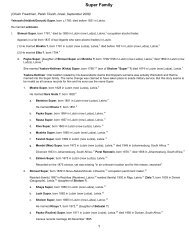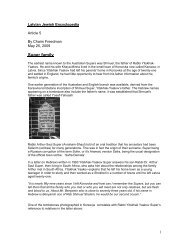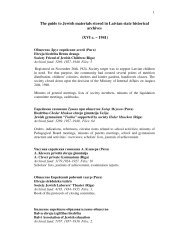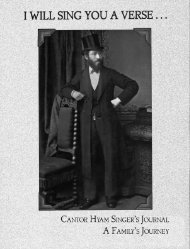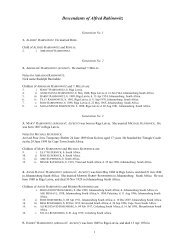Small Riga Ghetto
Small Riga Ghetto
Small Riga Ghetto
You also want an ePaper? Increase the reach of your titles
YUMPU automatically turns print PDFs into web optimized ePapers that Google loves.
138<br />
(Bombs, bombs fall down) was very popular, as was his song "Es gehen Kolones,<br />
es gehen Korbones" (Columns are marching, victims are marching).<br />
Like many others, I was very impressed by the concert given by the pianist<br />
Herman Godes. At that time he was still very young; in my opinion he will<br />
have a great future.<br />
Roschmann and his staff (Gymnich and Buchholz) also came to the concert.<br />
He had even taken along his big dog. When "Roschko" came in, the elder of<br />
the German ghetto, Leiser, ordered everyone to stand up. He offered him a<br />
seat. But because Roschmann refused to sit next to Jews, he and his staff<br />
stayed standing at the door. But we noticed that he showed great interest in this<br />
concert.<br />
Professor Metz (violin) and Temko (cello) gave two large concerts. Professor<br />
Metz invited me personally to the first one, and dedicated it to the memory<br />
of the composer Rubinstein, who had been a Jew converted to Christianity. In<br />
his introductory words he reminded us of Rubinstein's career in Petersburg.<br />
Petersburg – through his words, my thoughts too went back to the beautiful<br />
years of my youth in that city. The concert was full of solemnity. At the express<br />
wish of Professor Metz, nobody applauded. The applause was expressed<br />
only by our tears.<br />
This concert was attended even by Professor Gurwitsch (father of the wellknown<br />
pianist Horowitz), who did not participate in the cultural life of the<br />
ghetto in any other way. Because he was married to an Aryan woman, he was<br />
sent to the ghetto fairly late, and now he worked in a plant nursery.<br />
Now and then Mrs. Hanna Taitz charmed us with her folk songs, which she<br />
had brought with her from Paris in earlier times.<br />
The German ghetto was no less active in organizing artistic performances.<br />
We were completely enchanted when Mrs. Burian (from Prague) sang "Madame<br />
Butterfly" in her sweet voice. The saxophonist Jonny was very popular<br />
because of his song "Mama", and a Czech Jew sometimes provided excellent<br />
entertainment with his patter. He was later hanged by Blatterspiegel at Spilve.<br />
The climax of the season was a performance of the play "Jeremiah", which<br />
had been organized with great effort by the Jewish elder, Leiser. Considering<br />
the circumstances, the stage design was very good. A genuinely talented actor,<br />
Diesendorf * from Vienna, played the leading role.<br />
But the period of all these cultural offerings did not last long, because of the<br />
liquidation of the ghetto.<br />
* [Ed.: Weissenstein, not Diesendorf. The latter played Faust.]



